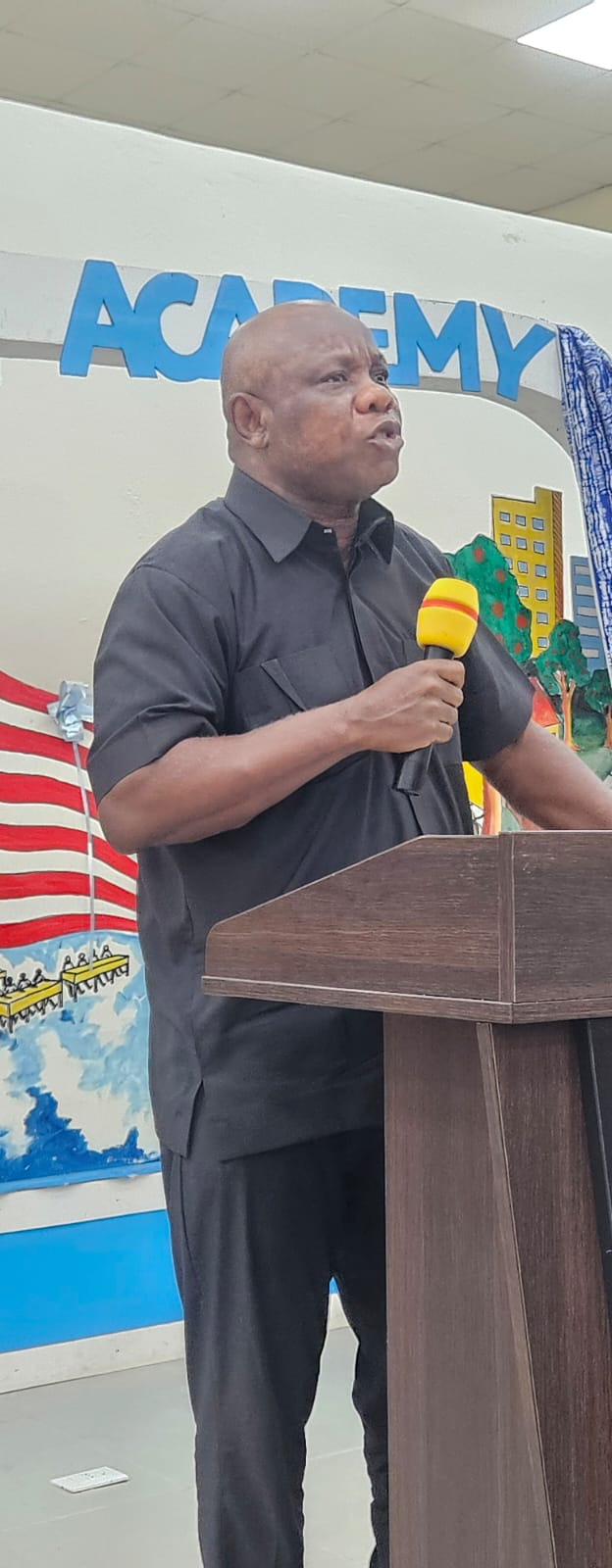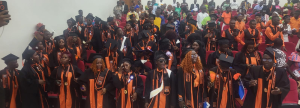By Festus Poquie
The steady erosion of education standards in Liberia threatens the country’s economy, governance and national security, former Finance Minister Samuel Tweah has warned in speech calling for hard reforms that will avert the existential threat to the nation of 5.5 million people.
Speaking at the Ben’s Foundation High School graduation in Marshall, Lower Margibi County, Tweah used blunt language to describe what he called a national slide into mediocrity.
“Continuous compromises of our education standards will lead to a national decline and there will come a time where Liberia will be a laughingstock because the complex challenges of tomorrow will not be resolved by unprepared and inadequate minds of today,” he said.
He added that if the trend continues, “our nation will cascade into the hands of unprepared people, and this country will explode!”
Tweah tied education quality directly to economic growth and national resilience. He urged immediate and radical action to arrest declining learning outcomes, raise accountability and reform how students are tested and graded.
“We cannot continue to lower standards,” he told school administrators and educators and policy actors across the country.
“When we lowered standards, we hindered transformative drive. When we accommodate students, we hurt Liberia.”
A radical proposal: an “invisible” exams system
One of the headline proposals in Tweah’s address was the creation of what he called an “invisible system” to manage testing, examinations and evaluation.
Under his outline, teachers would retain a small role in assessing students (15 percent of a student’s grade), while the vast majority of evaluation (85 percent) would come from an independent, secure system whose origins and handling would be hidden from teachers and students.
The idea, Tweah said, is to remove incentives and opportunities for grade manipulation and create stronger incentives for students to learn because they would not be able to predict or control the high stakes testing mechanism.
“This invisible system is designed such that it will not be susceptible to complications,” he said, suggesting randomization (a “lottery” approach) and a centralized technical platform developed by national experts.

He also called for new legislation—what he termed a National Education Standards Law—to institutionalize higher benchmarks and to strengthen mechanisms to prevent fraud.
Responsibility
Tweah said teachers ultimately govern the education system and that the current structure leaves them as the default locus of responsibility for failing graduates. He urged a shift in incentives and accountability to ensure that teachers, administrators and systems alike bear responsibility for learning outcomes.
He blamed what he described as a “deficit of integrity” among some actors in the system for the entrenchment of low expectations.
He cited a shift in passing thresholds— “If the passing grade was 70 bring it to 60”—as evidence of a broader willingness to lower the bar. He warned that Liberia is producing graduates who cannot read or write at expected levels, and that the consequences are not confined to schooling but will ripple across governance, economic productivity and national security.
Tweah also invoked the Maputo Declaration, which asks African governments to allocate 20 percent of national budgets to education.
He said Liberia spends roughly 14 percent of its budget on education and contrasted that to other low income countries such as Sierra Leone and The Gambia, which he said prioritize higher standards despite facing similar fiscal constraints.
What this means for Liberia’s economy and security
Tweah framed the decline in learning not only as an education problem but as an economic threat: low learning outcomes reduce workforce productivity, weaken the pipeline of skilled professionals, and limit the country’s ability to address complex policy and technological challenges.
He warned that underprepared graduates entering public service and the private sector will reduce governance capacity and could create openings for poor policy choices or instability.
Liberia’s adult literacy rate has been low relative to global averages. Estimates from UNESCO and World Bank in recent years put adult literacy in the range broadly near 40–60 percent, indicating a large cohort of adults with limited literacy skills.
Early grade learning: national and donor supported assessments (including EGRA-style early grade reading assessments and national exams) have repeatedly shown a large share of primary grade students performing below expected grade level in reading and numeracy—an outcome Tweah highlighted when noting third graders who cannot read at grade level and ninth graders reading at a much lower level.
Primary gross/net enrollment ratios in Liberia have improved since the end of the civil war, but completion and transition to upper levels remain challenges. Net completion and transition rates are still below what is needed to produce a broadly skilled workforce.
Regional comparisons:
Tweah claimed Sierra Leone and The Gambia spend roughly 17% of their budgets on education and have higher standards despite similar post conflict constraints; while exact intercountry comparisons depend on the year and metric used, the broader point is that countries with comparable fiscal constraints can and do maintain higher learning standards through prioritization and stronger accountability systems.

Policy implications and next steps
The Tweah’s intervention or proposition highlights several policy priorities for Liberia’s education sector:
Strengthen national standards and legal frameworks: passing a National Education Standards law, as Tweah urged, could set clear targets for learning outcomes, teacher qualifications, and accountability.
Centralize and secure high stakes testing: an independent national testing authority or secure national exam system could reduce opportunities for grade manipulation and improve comparability across schools.
Improve teacher support and accountability: rather than placing sole blame on teachers, reforms should align teacher incentives, provide professional development, and establish transparent evaluation systems for performance.
Increase and better target financing: moving closer to the Maputo target—or at least ensuring a greater share of education funding reaches classroom inputs (teacher training, learning materials, assessment systems)—would be essential.
Invest in early grade reading and numeracy: international experience shows that targeted early interventions yield large learning dividends and improve later outcomes.
The speech could likely reopen public debate on how Liberia funds and manages education and on accountability mechanisms. Education activists and international partners have long argued for stronger assessment systems and more funding.
Tweah’s call may bolster those arguments while raising questions about implementation feasibility and the political steps needed to pass new laws or construct centralized testing mechanisms.


